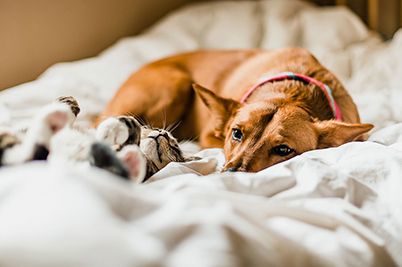Fashion icon Karl Lagerfeld wasn't shy about his love for his cat and often mentioned that she would share in his estate. Lagerfeld's death and his close relationship with his cat serve as a reminder of the importance of formalizing a plan for your pet's care in your absence. Without a plan, a pet could face a dismal fate. A pet trust is among the preferred options to give you the most control and certainty over your pet's care during and after your lifetime.
Before his death, Karl Lagerfeld let the world know that his beloved cat Choupette would continue to enjoy a life of luxury for as many lives as the 7-year-old kitty has remaining.
The unmarried and childless fashion designer died Feb. 19, 2019, leaving his well-kept companion as his most notable survivor. The white-coated Birman's Twitter site proclaims that “maids pamper her every need” and displays photos showing her gazing from the window of a private jet and snuggling in silk sheets.
The public has a fascination with stories about wealthy celebrities and their pets, and the legend of Choupette Lagerfeld with her diamond-encrusted collars and human attendants is the latest among them.
Media reports say he was open about his plan to continue funding Choupette's lavish lifestyle that includes not only maids but also a chauffeur, personal chefs and other extravagances. Choupette herself has generated millions in income though merchandising, a huge social media following and her modeling work - literally on the catwalk for Lagerfeld's legendary House of Chanel.

Lagerfeld, who died at age 85, may be among the super-rich, but he was in a situation familiar to most Americans. A recent survey found that 68% of U.S. households - 85 million families - own a pet. Just like millions of people in his age group, Lagerfeld had no immediate heirs but was devoted to his pet and treated her like family.
While Lagerfeld left his mark on the world of fashion, his passing also is a reminder of the importance of including your pet in your estate planning.
People fret about leaving a pet without care for even a day. Do you ever wonder what would happen to your pet if something happened to you? One outcome is for certain: If you don't include your pet in your estate plan, you'll have no control. Without you around, your pet could be headed to an animal shelter - or even euthanasia. A failure to plan can have dire consequences.
“I have seen MANY, MANY dogs and cats brought to the shelter (I am an animal rescuer and an attorney) after their owner died, and they were dying of heartbreak themselves,” observes New York-based attorney Carol Ryder. “Going from a warm, loving, clean, quiet home, regular walks and/or a yard, a deck to sun on, etc., to a smelly, dirty, noisy shelter and being stuck in a cage 24/7 is torture for them, and looking into their eyes, you cannot help but cry. Many of these pets end up euthanized, too old, and too scared-looking when potential adopters show up, to be adopted.”
How should I plan for my pet's long-term care?
Pets, in your absence, need a designated caretaker, a place to live, food, medical care and some TLC. Those are essentials that even spoiled cats like Choupette could appreciate - and they don't require a Lagerfeld-sized fortune to provide.
However, it's important to choose the right kind of plan that leads to your desired outcome.
If you make informal arrangements with a third party for the future care of your pet, there's no guarantee your intentions will be followed, according to the American Society for the Prevention of Cruelty to Animals.
Unfortunately, even if you leave assets in your will for the long-term care of your pet, the recipient - often a family member, neighbor or friend - is under no legal obligation to honor your wishes. Your will only states intentions that may or may not be followed; a will is not a binding contract.
The ASPCA discourages will-based plans “because any delay in administering your estate could spell trouble for your pet.” Pets have immediate needs, and their welfare could be in jeopardy while a will is tied up in probate court. A trip to the pound could mean a death sentence.
A pet trust, a special type of revocable living trust with a specific purpose, is an effective solution that addresses contingencies during your lifetime as well as long-term needs, planning experts say. A properly funded pet trust can be used to pay for ongoing pet care if the owner, for example, must move from the home, is incapacitated or no longer able to physically care for the animal. Wills don't address the issue of arranging for a caretaker for your pet in the event of an emergency during your lifetime.
Unlike a will, a pet trust is a legally binding contract. The trust holds funds and includes instructions, which can be as specific as necessary, for the ongoing care and maintenance of your pet and compensation for the trustee and/or caretaker. You create and control the trust during your lifetime, and the successor trustee you appoint takes over when needed.

A trust can be used in conjunction with a financial power of attorney. Your POA, effective during your lifetime, also can include language that authorizes your agent to pay for your pet's care should the need arise.
As of 2016, all 50 states had laws allowing pet trusts in some form, according to the ASPCA. Generally, states allow you to create a pet trust to benefit animals alive during your lifetime. Pet trusts typically terminate at the death of the last surviving pet or after a certain time period.
Planning experts caution that the financial bequest should be reasonable and in line with the needs of the animal and compensation for the caretaker. Pets are precious family members, but leaving a Lagerfeld-sized sum to care for an animal can invite challenges from would-be beneficiaries who may feel slighted.
Perhaps the most important duty for pet owners is to select the right people, and alternates, to ensure your plan succeeds. Communicate ahead of time with your entire support group - designated caregivers, family members, loved ones, your successor trustee and power of attorney - and make sure your intentions are clearly understood and documented with the assistance of estate planning professionals.



